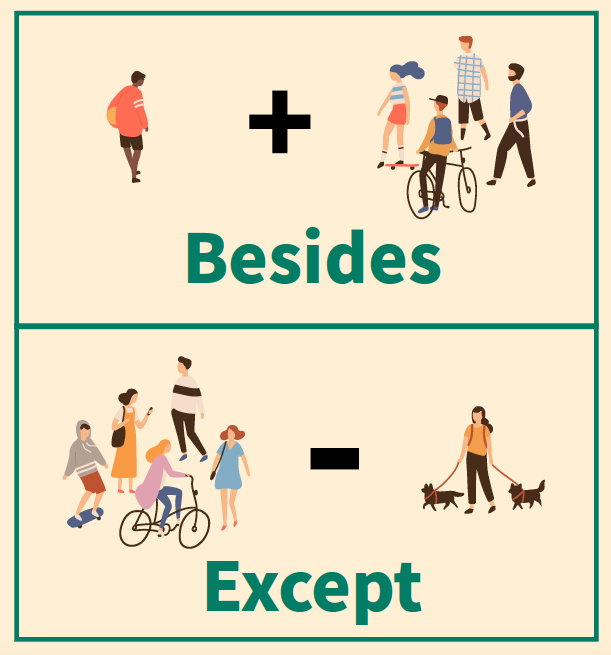
多益英文寫作BUG

多益測驗除了聽力、閱讀,近年口說及寫作也紛紛也成了許多公家機關、航空公司等職缺的能力門檻。寫作測驗共八題,作答時間60分鐘,英打方式作答。練好英文寫作,從選字細節開始修正,以下的例子都和中英文邏輯思考有關,像是:中文都叫做「除了」,英文的選字卻不一樣、中文說「吃過」,英文不能用eat 、中文說「雖然… 但是」,英文只能挑一個寫。
1. ever
他曾經住在紐約。
(X)He ever lived in New York.
(O)He once lived in New York.
ever意思是「在任何時候;從來」,寫成第一句是因為受問句影響:“Have you ever lived in New York?”(你曾經住過紐約嗎?)放在問句ever可以這樣用,但不能以此推論放進肯定句裡。Ever出現在肯定句中時常帶有比較意味,像是:
This is the best burger I’ve ever had.
這是我吃過最好吃的漢堡!
2. though
雖然Will 很難相處,但他真的很有才華。
(X)Though Will is a pain in the neck, but he is very talented.
(O)Though Will is a pain in the neck, he is very talented.
中英文邏輯不同,中文句子說「雖然…但是」、「因為…所以」,英文則是一個句子裡,一個連接詞連接兩個子句。
3. uncomfortable
我身體不舒服。
(X)I am uncomfortable.
(O)I’m not feeling well.
Uncomfortable是心理層面的「不舒服」,感到尷尬、不自在時才會用,類似的字還有 uneasy、 awkward。表達身體不舒服,用 “I’m not feeling well.”、 “I feel sick.”、 “I’m sick.”
4. eat
我吃過那家餐廳。
(X)I’ve eaten that restaurant.
(O)I’ve been to that restaurant.
中英文邏輯不同,中文我們會說「吃過」這家餐廳、「喝過」那家飲料店,英文則只會說「去過」那家餐廳,吃、喝後面接的是食物。單純用中文邏輯直翻eat the restaurant,在英文聽起來就是字面上的「把餐廳吃了」。
5. part-time
他是我打工認識的人。
(△)I know him from my part-time job.
(O)I know him from work.
兼職工作是part-time job 沒錯,但這個字被我們用得太頻繁,頻繁到在老外耳中聽來不自然,除非特別想強調「工作是兼職制」用“I work part-time” ,一般時候直接說“I have to work later. ” (我等等要工作。)不用拘泥「打工」的概念。
6. memorize vs remember
把這首詩背起來。
(X)Remember this poem.
(O)Memorize this poem.
memorize和remember的字典解釋:
memorize: to learn something so that you will remember it exactly 記熟、背熟
remember: to be able to bring back a piece of information into your mind 記得
例句中的「把詩背起來」,需要花心思「記熟」,用memorize。回想已經存在腦中的資訊才用remember「記得」。
7. so vs so that
她的咖啡灑到我的洋裝,所以我必須換一件新的。
(X)She spilt coffee on my dress, so that I had to change into a new one.
(O)She spilt coffee on my dress, so I had to change into a new one.
連英文程度不錯的學生有時也會不自覺地畫蛇添足,第一個例句的寫法語意是「她的咖啡灑到我的洋裝,這樣一來我就得換件新的。」So that描述做一件事的目的,所以前面「咖啡灑到洋裝」的動作是有意圖的。
8. besides vs except
除了Tom,還有誰會來?
Besides Tom, who else will come? Tom會來
Except for Tom, who else will come? Tom不會來
只讀中文,這句話意思有些模糊,會讓人懷疑「Tom到底會不會來?」第一句besides是「Tom要來,還有誰也會來?」第二句則用except for意思代表「Tom被排除在外,其他人有誰會來?」besides和except中文都解釋成「除了」,其實兩者不一樣,差別在於besides是「包含」的概念,except是「不包含」。
本文摘錄自一張圖搞懂 辦公室英文 2019年01月號
訂閱雜誌
| 加入Line好友 |  |

 擔心生理健康,心理卻出問題?
擔心生理健康,心理卻出問題?